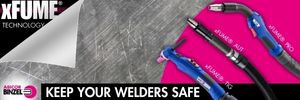Outsourcing: The Answer to Automated Welding PM Needs?
Outsourcing preventive maintenance frees your staff to focus on core competencies while leaving this critical function to expert providers.
Posted: August 26, 2014
Robotic welding cells and other automated welding equipment require targeted, routine preventive maintenance (PM) programs to ensure proper operation and provide maximum in-service lifespan. Such a program involves a routine, systematic inspection, adjustment, lubrication and replacement of components, software upgrades, and performance testing and analysis.
But finding in-house resources – either in budget or staffing – to develop a targeted automated-welding PM program and follow through with it on dedicated, regular basis can be difficult or impossible for many fabrication shops.
So why not consider outsourcing? Third-party PM providers allow your in-house maintenance staff to focus on core competencies. In addition, outsourcing leaves inspections, cleaning and maintenance to seasoned experts well-versed in automated welding equipment.
While equipment providers do offer suggested PM guidance in their service manuals, these guides provide only an initial template for program development and execution. If you’re not experienced with the nuances of the maintenance required, you’ll likely find yourself faced with some frustrating guesswork once you are deeper into the process.
Outside PM services, on the other hand, will examine your operations and equipment, assess your manufacturing environment and help you determine the right course of action for your facility and automated equipment.
As PM experts will tell you, there really is more to maintaining an automated welding power source than simply blowing the dirt out of it. For example, special processes are required to fully clean and degrease a power source exposed to months or years of shop environmental contaminants.
As such, many general service centers don’t always understand how this type of equipment functions or how it needs to be inspected, cleaned and serviced. PM specialists that focus on automated welding equipment know exactly how to care for such specialized equipment.
Your equipment manufacturer can help recommend maintenance providers, and some manufacturers even offer this service themselves. In fact, chances are good that employees at these centers have worked on the production line, designing and building the very machines they now service.
When considering the qualifications of potential service partners, be sure to ask: Can the service provider not only inspect and clean your equipment but also offer parts and repairs, computer diagnostics, service upgrades and weld testing on automatic equipment? Centers strictly focused on automated welding system maintenance and repairs typically offer a turnkey approach to PM, providing a full range of necessary services.
Also ask potential PM providers if their shops offer proper testing, diagnostic and calibration equipment. Do they test the machines upon arrival to see what errors might have occurred during operation? A good PM provider will troubleshoot both welding robots and wire feeders, using computer diagnostics and simulation of the robotic operations to identify potential areas of failure before they happen.
Next, investigate what processes these providers use to perform maintenance, cleaning and repair. A good shop won’t service a dirty machine and instead will disassemble and clean it first, using a proven washing and drying process.
Environment-friendly degreasing is another must in this era of environmental regulations. Not all shops offer this benefit, so ask your prospective providers if the processes they use are environmentally safe.
One of the most important parts of any PM program is the testing performed after cleaning. At many service centers, technicians simply power up the machine after maintenance to ensure that it works. – that’s as far as testing goes, at least in their shops.
But, there’s more to robotic welder maintenance than simply powering up a clean machine. The best providers perform thorough testing on all robotic components to ensure that the units are ready to go back online and do their job.
Lastly, make sure that providers can update equipment software to the latest versions as part of their PM activities. Current software keeps your production line running efficiently and smoothly and gives you access to the latest system capabilities.
Potential upgrades might involve updated communication protocols for use with other plant equipment, faster communication between the welding system components or updates to the welding waveforms for specific applications. Along with servicing the machine’s mechanical and automation components, a provider might be able to provide a software upgrade for potential gains in productivity or operational efficiency.
Ask PM providers how they can help you avoid downtime while a machine is offline for PM service. Do they offer rental services to ensure that you can remain operational? Some providers offer a free rental unit for the time your machine is in their shops, billing only for the time when the machine is in transit to and from the service center. Such an arrangement means paying rent only for a few days even if your robotic welder is in the shop for a month.
While in-house PM may seem efficient at first, those maintenance dollars may be better spent when working with a provider specifically focused on welding automation maintenance and reconditioning. That leaves your team to focus on what they do best – manufacturing.
Bob Steinke is manager of Lincoln Electric’s Regional Automation Service Center (RASC) in Nashville, TN. Bob Rickel is a service technologist at the RASC.
The Lincoln Electric Company, 22800 Saint Clair Avenue, Cleveland, OH 44117-8542, 216-481-8100, www.lincolnelectric.com.

















